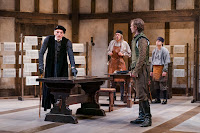By Ruth Ross
As Director (STNJ Artistic Director Emerita) Bonnie J. Monte so eloquently writes in her director’s notes,
"Shakespeare has been in the news at some place or many places in the world, every single day of the week, every week of the year, every year since his death in 1616. If one tried to calculate the number of times he, or his plays, or his words showed up in print or in conversation, or in any other kind of media or art form since his death, it would be impossible."
That the scribblings of a working playwright, who wrote for performance, not posterity, could and would be read by high school and college students and performed on amateur and professional stages all over the world and in many languages is the subject of a thrilling play, The Book of Will by Lauren Gunderson, onstage through July 28 at the Shakespeare Theatre of New Jersey in Madison.
At times dramatic and often very funny, The Book of Will recounts the tenacity of two of the Bard’s fellow actors, Henry Condell and John Hemings (and the women in their lives!)—“lions of the boards”—to rescue Shakespeare’s words from anonymity and preserve them for posterity through the medium of print. In an age when expensive printing was reserved mostly for religious writings and it was “publish or vanish,” this task was not only daunting but courageous.
The main stage production—the second offering of the STNJ season—crisply directed by Monte, features crackling wit and clever dialogue, delivered by a talented cast featuring several STNJ veterans. Michael Steward Allen is a driven Henry Condell, passionately brushing aside the objections of a more brooding, business-minded John Hemings, played by Anthony Marble. The scene where he mourns his wife Becky’s death is especially moving, especially when Condell stresses the importance of the theatre in assuaging grief: to perform is “to live again” each time! Before he disappears after the first scene, Brent Harris’s Richard Burbage (left) is professionally incensed by the bastardization of Will’s words by incompetent acting companies working from corrupted and incomplete scripts.
As Will’s nemesis Ben Jonson, who looks down on Shakespeare because he lacks a university education, Pearce Bunting is hilarious and offensively pompous—and drunk most of the time. Harris doubles as the crab-like, grasping printer William Jaggard (right, in black), who has produced quartos of the plays but never an entire compendium (in folio form), a much more expensive undertaking he is loath to undertake. His son Isaac, as played with equanimity and grace by Isaac Hickox-Young (far right), saves the day.
Amid this male turmoil, it is the women—Elizabeth Condell (Amy Hutchins), Rebecca Hemings (Victoria Mack) and her daughter Alice (Carolyn Leys, left with Bunting and Marble)—who provide the confidence and support so sorely needed to complete the project. This trio lights up the stage whenever they appear; they are more outspoken than one would expect from a 16th century woman, and extremely likeable. They also take on lesser roles, Emilia Bassano Lanier (the “Dark Lady” of Shakespeare’s sonnets), Susanna Shakespeare and Anne Hathaway, with aplomb.
In minor, yet important, roles, Patrick Toon is funny and imposing as the head Compositor and Jack Steiner does a fine job as editor Ralph Crane, who comes up with a way to solve the problem of an “impossible project”: printing a folio of complete works. Gerardo Garcia appears as town crier announcing theatrical performances from time to time, separating the major scenes.
Of course, all this talent is enhanced by Sarah Beth Hall’s half-timbered set designed to serve as a tap room, a printing office, and several domestic locations. Matthew Adelson once again provides appropriate atmospheric lighting while Bonnie J. Monte’s sound completes the effect. And Hugh Hanson is to be commended for the costumes worn by the actors; we get a firm sense of time and place with the doublets, capes, and the like.
The plot of the film, Shakespeare in Love, was pure imagination. In a talkback with Monte and the actors, she said that The Book of Will is based mostly on facts gained from ledgers, diaries and other writings left by Condell and Hemings, among others. Alice Hemings is a fictional character and a delightful one at that!
So, it’s important to pay our respects to these audacious and tenacious King’s Men who
saved for posterity this “priceless gift to humanity” (Monte)! The Book of Will will appeal to those who love the Bard, who love the theater and who love looking behind the scenes to learn how masterpieces come about. Oh, and it would be a terrific play to bring a high school student to see. It might make them more appreciative of how and why they read Shakespeare in school—and might move them to see a production of one of the Bard’s plays through different eyes!
The Book of Will will be performed at the F.M. Kirby Shakespeare Theatre on the campus of Drew University, 36 Madison Ave., Madison, through July 18. For information and tickets, call the box office at 973.408.5600 or visit www.ShakespeareNJ.org online.
Photos by Avery Brunkus





